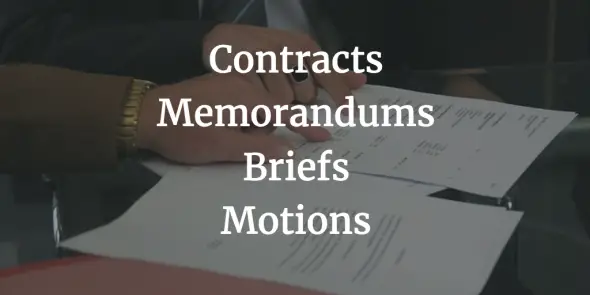Ads for legal writers may have caught your eye over the years, but you may not have bothered taking a look because you don’t know really know anything about legal writing. Nothing to be ashamed of – you’re part of the majority. Since legal writing is a very specific niche, there are fewer freelance writers who specialize in it.
Did you hear that? The sweet tinkle of the bell of opportunity.
Specific niche = less competition = higher rates
First, though, you actually need to answer the question: “What is legal writing?”
Let’s dive right into it.
What is legal writing?
[bctt tweet=”Legal writing presents huge opportunities for freelancers, but what is it? ” username=”freelancewj”]
Legal writing involves the production of any form of material used in the legal industry. It falls under the category of technical writing. Lawyers, judges, and legislators employ this type of writing for laws, expression of rights, duties, and other legal analyses. In these cases, the term legalese is often used and specific formats are followed. Some types of legal writing jobs under this category:
- Brief writers. They research and write legal documents such as briefs, memorandums, and motions.
- Legal analysts. Their tasks include summarizing case laws, news, and analyzing industry events.
- Legal correspondents. They report and analyze news regarding the legal industry.
In other cases, legal writing takes on a less technical form. Examples:
- Feature writers. They write law/legal-related articles for publications, online and offline.
- Web content/copywriters. They provide web copy for law firms, law-related websites, and other online publications.
- Corporate writers. They write for the legal industry on a wide scale, with the scope of their writing covering anything from press releases to brochures and leaflets to presentations to reports – and even academic material.
Take the quiz: What Type of Freelance Writing Gig Suits You Best?
How to become a legal writer
[bctt tweet=”How to become a legal writer and earn more.” username=”freelancewj”]
To become a legal writer, you will need more qualifications than a generalist content writer. It is not enough to be an excellent writer. At the very least, you’ll need to have some knowledge of legal terms. For the more technical jobs, you may even be required to have had law classes or a law degree. Paralegals are also in high demand for this type of writing gig. The standards are high, but there is a reason legal writers demand higher rates.
But, if you don’t meet those requirements, don’t be discouraged. If you really want to become a legal writer, you still can. Usually, a GED or high school diploma is enough. However, a college degree is even better.
Example: You may not have any law-related degree, but you can still work as a legal writer for a Los Angeles divorce lawyer, providing legal content for their website. Or, you can work for the same firm as a copywriter for their brochures, newsletters, and business letters. Alternatively, you can maintain their blog. In fact, we regularly see ads seeking legal writers for law firm blogs and websites.
Develop these skills
To become a legal writer, you have to have specific skills.
Needless to say, you have to master writing in English. This may be obvious, but if English isn’t your native language, make sure your writing is on par.
You need to know legal terms. You have to have the skill of turning complex ideas and legalese into easy-to-understand content.
You need excellent research skills and know how to cite sources.
Where to begin
Easy peasy.
Apply that last skill: research.
There are literally thousands of websites you can read to teach you about legal writing. Visit:
- Law firm websites
- Sites that offer legal advice
- Government portals where you can find laws and ordinances
- Sites that provide legal templates
- Online newspapers.
Reading legal material is the start of your education.
Don’t stop until you are confident you can do a decent job.
Essential reading: Tips for Legal Writing
The next step is to look for jobs and just go for them. The worst that can happen is that you don’t get hired. If you do get hired, make sure you don’t bite off more than you can chew. Remember, you’re starting out in a new niche. It’s okay to admit it if a job is beyond your abilities. It’s okay to start small if necessary. At this point, the goal is to gain experience.
Upwork is a good place to start for small jobs (though you’ll find big ones, too). You can also join Flexjobs for curated jobs, and of course, we have our own daily list of writing jobs where you can find legal writing gigs.
To narrow down your options, visit sites such as Law Crossing, which caters to all legal professionals. You can also search for law firms in your area and check if they are hiring writers.
Becoming a legal writer entails pretty much the same thing as becoming a writer in any niche — learning, practicing, and hustling.
Wash. Rinse. Repeat.
Are you a legal writer? What tips can you give your peers who want to enter the niche? Are you looking to become a legal writer? We hope this article helps you get started.





Leave a Reply